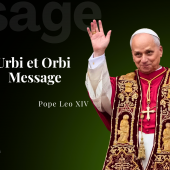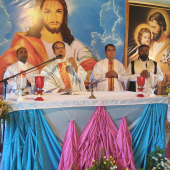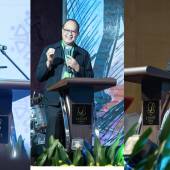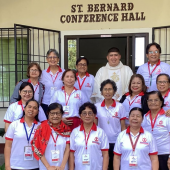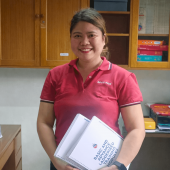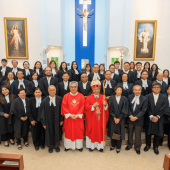Catholic establishes lay Missionary Institute in Myanmar
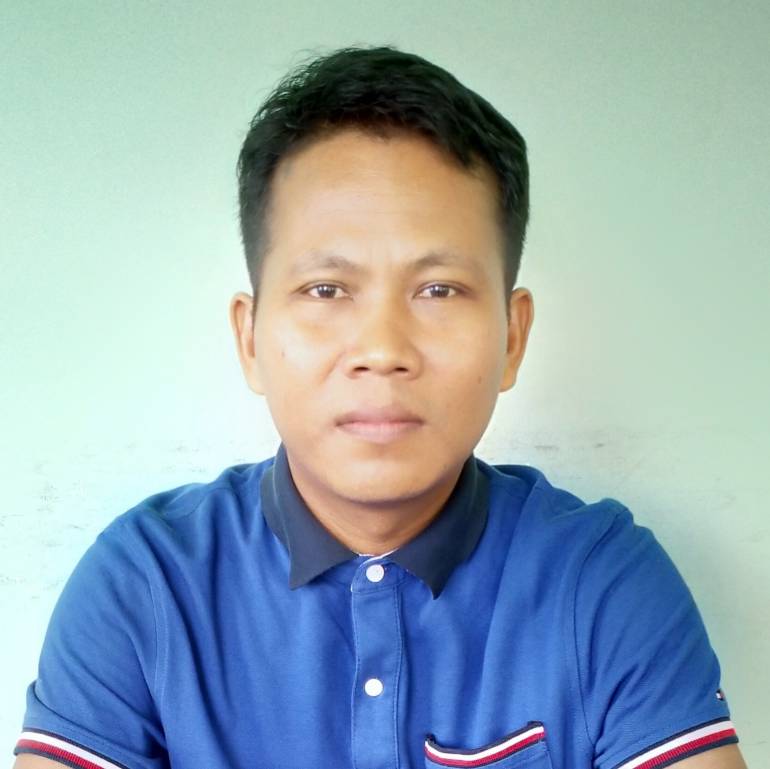
Many Catholics in Myanmar think that theology is reserved for candidates for the priesthood and religious life. In Myanmar, there are very few institutes in which lay Catholics can study theology.
The conversations with some laity led Dr. Maung John, 48, to notice the need for religious education for adults in Myanmar, for he met a few Catholics who studied the bible and theology in Protestant institutes.
He said that he had to commit himself to the theological education of laypeople.
John studied at St. Vincent School of Theology, Loyola School of Theology, the University of Santo Tomas, the Divine Word Institute in Tagaytay, and Maryhill School of Theology and the Asian Social Institute in the Philippines.
After receiving his doctoral degree from the Institute for Consecrated Life in Asia (ICLA), he tried to implement his dream with the knowledge he had received from ICLA, Philippines.
With his relentless efforts and bountiful knowledge, the Lay Mission Institute (LAMIN) came into existence in Yangon, Myanmar, in 2017.
When the church underscores the importance of the laity in the evangelizing mission of the church and at the time of the synodal process, the institute is a sort of right action on the ground.
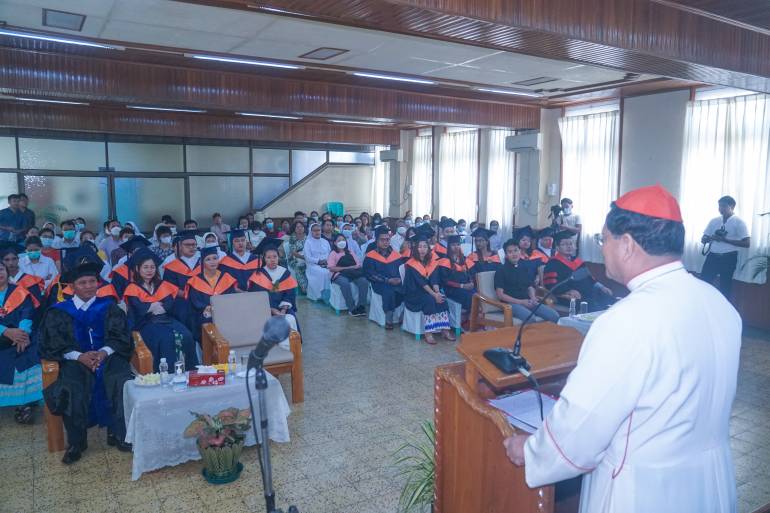
Cardinal Charles Maung Bo of the Yangon Archdiocese endorsed the project. The Yangon Archdiocese supports the Institute’s programs.
The Institute has produced 112 graduated students and awarded a Diploma in Applied Theology.
"Students are from different walks of life, such as priests, monks, scholars, activists, social workers, migrant workers, and others. They belong to Catholics, Christian denominations, Muslims, Hindus, and Buddhists," John, the founder, told RVA News.
The alumni were lay Catholics for the first two years. Due to online classes, students from other religions could join the Institute’s program with two Catholic priests, over 20 nuns, and their postulants. Thus, the Institute has become an ecumenical and interreligious formation center.
A Baptist social worker, Saw Kalu Moo, 27, said, "As the institute welcomed all enthusiastic learners, students came from different religions and different communities, so I experienced seeing new perspectives of people from different walks of religious life."
When the COVID–19 pandemic broke out, the institute shifted to virtual classes, and students from Association of Southeast Asian Nations (ASEAN) member countries, Europe, India, and the United States joined the program.
In response to this time of difficulties in different ways, the outcome was that more students could study theology virtually.
John said, "I do not focus on problems but I focus on results and solutions."
He added that the institute was growing despite the current chaos in the country.
"As a teacher, my happiest moment is the graduation events," he said.
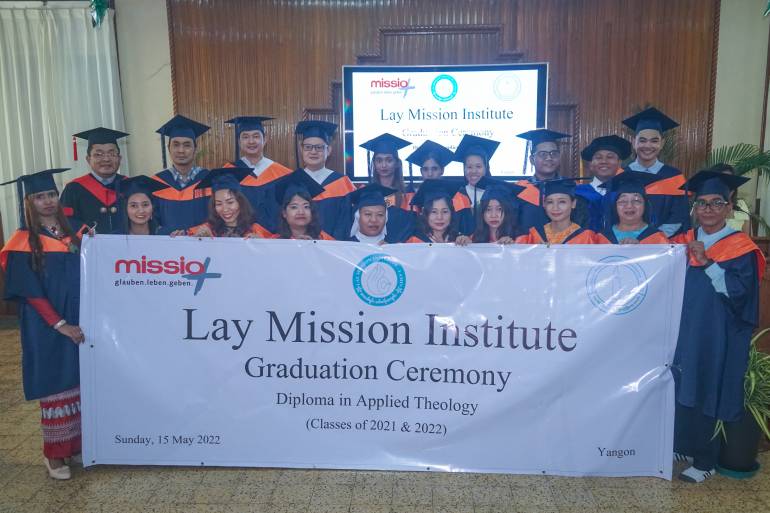
The founder has a plan to enhance online learning platforms where the laity, clergy, and nuns can learn religious studies according to the signs and needs of the times in the local language as society is becoming diverse, global, and digital.
The Institute intends to promote theological studies understandable to people from various backgrounds in life and faith.
John said, "The Institute has to design a strategic plan for the long term. Currently, the institute is developing a five-year strategic plan. In order to execute the 2023–2027 strategic plan, the Institute welcomes collaborators, supporters, and partners.
He belongs to the tribe of the Falam Chin ethnic group in the western part of Myanmar. His parents, U. Paul Siah Kulh and Daw Regina Lian Tial, were converted to Catholicism, and his father was a Baptist before he got married to his mother.
They have seven siblings, two sisters and four brothers. He is the second youngest son.
His wife is Rosa Phyo Wai Lwin, the owner of the Gems and Jewelry shop. They have an eight-year-old, Mariano, and a five-year-old, Oscar Romero.
Many have appreciated John’s foresight, initiative, and contribution of LAMIN to society and the church in Myanmar.
Salai Henry of Karuna Mission Social Solidarity-Hakha (KMSS-Hakha)/Caritas Myanmar told RVA News that LAMIN Institute enhanced his capacity and ability to serve, protect, and defend the most vulnerable, marginalized, and conflict-affected people in Chin State in Myanmar.
The Institute has a virtual alumni group where they share their lives and involvements with the benefits of information technology.
Ms. Ya Min Pyae Phyo, 27, the founder of the Gender and Development Institute (GDI), said that she could establish a private institute of development skills with the knowledge from the LAMIN Institute.
She commended the subjects of Neuro-Linguistic Programming (NLP) and the International Coaching Foundation (ICF) at the LAMIN Institute.
The LAMIN institute teaches the foundational 15 subjects of Human Formation, Intellectual Formation, and Skill Development.
The institute is teaching Introduction to Theology followed by missiological subjects on world religions and interreligious dialogue, culture and religion (inculturation), the Church and the poor (liberation), and some other subjects.
Ms. Lay Lay, a 37-years-old, M&E Officer, told RVA News, "The institute teaches the students not only about theology but also invites guest speakers on personal development and many interesting topics."
Radio Veritas Asia (RVA), a media platform of the Catholic Church, aims to share Christ. RVA started in 1969 as a continental Catholic radio station to serve Asian countries in their respective local language, thus earning the tag “the Voice of Asian Christianity.” Responding to the emerging context, RVA embraced media platforms to connect with the global Asian audience via its 21 language websites and various social media platforms.









